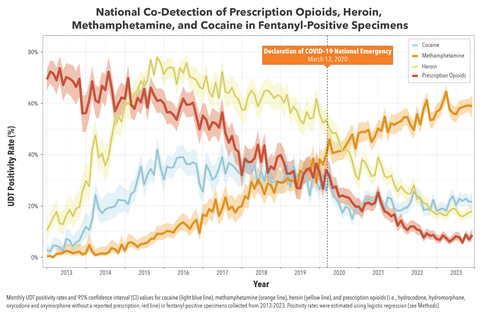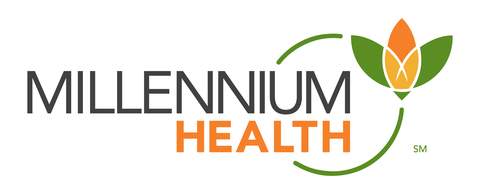SAN DIEGO--(BUSINESS WIRE)--According to Millennium Health’s Signals Report, a staggering 60% of specimens in 2023 from patients who have used fentanyl also contained methamphetamine, an increase of 875% since 2015. Cocaine, at a distant second, was detected in 22% of fentanyl-positive specimens in 2023, while heroin and prescription opioids continued to steadily decline to 17% and 7%, respectively—a historic low for prescription opioid detection in specimens positive for fentanyl.
America’s overdose epidemic is complex and has been broadly described as consisting of three “waves” that have involved prescription opioids, heroin, and fentanyl. More recently, a fourth wave of overdose deaths co-involving fentanyl with stimulants like methamphetamine and cocaine has emerged. Stimulants were co-involved in over 30% of fentanyl overdose deaths in 2021, up from less than 1% in 2010.
These current trends in drug use are detailed in the Millennium Health Signals Report: The “Fourth Wave” – The Rise of Stimulants and the Evolution of Polysubstance Use in America’s Fentanyl Crisis. The findings represent urine drug test (UDT) results from over 4 million patients across the 11 years since fentanyl first emerged as a major driver of overdose in the U.S.
“In addition to the rise of stimulants, our results show co-use of a diverse array of dangerous drugs at appreciable rates, some of which may be unintentional exposures,” said Senior Vice President and Chief Clinical Officer, Angela G. Huskey, PharmD, CPE. Nearly 93% of specimens from patients who used fentanyl were positive for at least one additional substance and almost half contained three or more. This includes xylazine, which was detected in nearly 14% of fentanyl-positive specimens in 2023. “These combinations increase overdose vulnerability and may lessen responses to overdose reversal agents (i.e., naloxone), making treatment as challenging as any time in history.”
The U.S. Centers for Disease Control and Prevention predicted more than 112,000 overdose deaths in the 12-months ending August 2023, with over 78,000 expected to be caused by fentanyl. Millennium Health’s Signals Report shows that UDT data tightly correlate with U.S. overdose mortality rates and closely follow the evolution of America’s fentanyl crisis.
Data in the Millennium Health Signals Report originates from the company’s Emerging Threat Intelligence (ETI) Program™. “The ETI program provides real-time surveillance of drug use trends to help clinicians, researchers, public health officials, and policymakers address our nation’s growing drug overdose crisis,” said CEO Scott Walton. “Although it is difficult to anticipate what may lie beyond the horizon, timely sources of data, such as UDT, may help to identify emerging threats and shifting patterns of substance use to reveal underappreciated layers of complexity in an everchanging drug use landscape.”
Methodology
The 2024 Millennium Health Signals Report is an analysis of urine specimens collected between January 1, 2013, and December 15, 2023. Included specimens were from patients aged 18 years or older. Specimens were collected in health care practices located in all 50 states. A single specimen per patient was selected based on the earliest collection date. More than 4.1 million unique patients are represented in the analysis. Further detail on the drugs analyzed and statistical methods is provided in the report.
A copy of the full report can be accessed here.
About Millennium Health
Millennium Health is an accredited specialty laboratory with over 15 years of experience in drug testing . We provide objective information about patients’ recent use of prescription medications and/or illicit drugs which helps clinicians monitor and treat millions of Americans living with chronic pain, substance use disorders, mental health disorders or other health conditions. Our ability to monitor drug use trends allows us to alert clinicians, health agencies and others to real-time drug use changes to help inform more targeted drug overdose prevention and response strategies to save lives.




